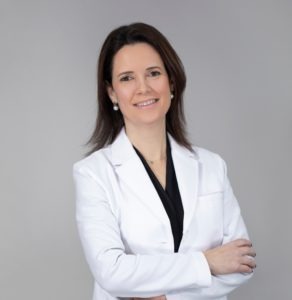A Born Mentor:
Endodontic Educator Fellow shares her passion for developing talent—and honing students’ referral skills
 For the Foundation’s 2021 Endodontic Educator Fellow, Dr. Ana Cristina Andrada, an assistant professor at Virginia Commonwealth University in Richmond, mentoring students’ dental expertise also means fostering the judgment to know which cases belong in the hands of an endodontic specialist.
For the Foundation’s 2021 Endodontic Educator Fellow, Dr. Ana Cristina Andrada, an assistant professor at Virginia Commonwealth University in Richmond, mentoring students’ dental expertise also means fostering the judgment to know which cases belong in the hands of an endodontic specialist.
Director of Predoctoral Endodontics at VCU, Andrada relies on the Objectively Structured Clinical Exam (OSCE) assessment developed by AAE member educators with Foundation support as a critical tool in training future general dentists.
“It’s not uncommon to see new graduates eager to take any case, but we prepare them with the OSCE assessment form to determine if they’re going to be able to do that case,” Andrada says. “We keep telling them you need to use the assessment form and refer if warranted, and be happy doing the crown. Even some cases where they think they can do it but realize later ‘this is more than I can do,’ we’ll talk about recognizing your limitations and being in close contact with your specialists.”
Implementing this assessment tool--which provides quantifiable measures upon which to base a decision to refer out a case--has become even more important as some programs shift to an “integrated” approach that replaces specialty departments with a general clinic in which all work is overseen by a general dentist.
“The specialists are there for consultation, but a general dentist is overseeing every single case,” Andrada explains.
At VCU, Andrada says her general dentist colleagues are appreciative of having departmental specialists.
“We just had a case this morning—The patient came for endo, I spoke with the GP to discuss restorability, then we got the periodontist involved, and we made a decision all together…I don’t think it should be one dentist treating the entire case. Even though [the general dentists] are going to be by themselves in their offices, they’re always going to have the support of their referral base.”
Andrada says she thinks the change to integrated programs is tied in part to the urgent shortage of endodontic instructors, underscoring the critical need for the Foundation’s role in endodontic education support.
As the daughter of two teachers, Andrada may have been born with the DNA for mentoring, but if you ask her, that only manifested itself epigenetically.
A Brazilian native, she completed both dental and endodontic specialty training at the Federal University of Santa Catarina (FUSC) in Florianopolis. Her mentor, endodontic department chair Dr. Wilson Tadeu Felippe, offered her the opportunity to pursue an academic career—an unexpected shift from her plan to remain in clinical practice.
“I never thought I would be academia in Brazil, but my mentor Dr. Felippe saw that in me,” Andrada said. “I didn’t believe I was patient enough to teach, but I always saw him and his wife (Dr. Mara Cristina Santos Felippe (FUSC department vice chair) do so much for us. I never thought that would be me. When I finished my endo training, he urged me to teach others. ‘You have that in you,’ he told me, ‘you just haven’t discovered yourself yet.’ They always supported me all the way.”
Moving to the United States to retrain in endodontics and earn a doctoral degree in oral biology (also earning an American D.D.S. degree at University of Detroit Mercy), she said she found the same mentoring encouragement from Dr. Robert White while at Harvard.
“Predoctoral and advanced graduate students routinely sought Dr. Andrada’s advice and consultation,” wrote Dr. White in his recommendation letter for the Foundation Fellowship. “Her ability to patiently listen, understand, clearly communicate and follow through are most notable character traits. She readily develops and maintains mentor relationships with her students, caring for them and, in turn, always learning with them. Her “classroom style” is engaging, interactive, and enthusiastic while remaining flexible and creative. Dr. Andrada truly enjoys sharing her knowledge and teaching.”
Andrada also brings elements of her Latin heritage to the teaching experience. She particularly appreciated a feeling of family within her professional community in Brazil.
“Everyone was family, everyone was there to support each other, to grow together. That’s what I want to pass to my students now…they should know my door is always open, you can knock and close the door and cry if you want, or just share something nice, I’m here for them. It’s very fulfilling. That’s what I want to do every day--when a student texts me in a panic about a no-show, being able to reassure them we’ll find you another case…having that relationship with them, I just love it.”
Her own growth as an educator has also been enhanced greatly by participating in the American Dental Education Association (ADEA) Leadership Conference, thanks to a scholarship from the Foundation.
“I didn’t know that I was already leading,” she says of her self-realization in participating in the program. “In the position you’re in, being faculty and a course director, you don’t see the everyday things you do as part of your job as leadership, but it was eye-opening how much we are being leaders every day, how much our students look up to us every single day in and out of school and in everything we do. After that I hoped to have more of those leadership position at school, so I volunteered for committees at work and in AAE. It’s eye-opening that I can make a difference.”




